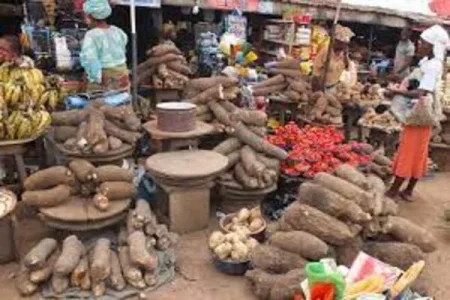
The National Bureau of Statistics reports sharp increases in prices of staple Nigerian foods like rice, garri, tomatoes, beans, and yam in Tinubu's first year as president.
Nigerians are grappling with soaring food prices during President Bola Tinubu's first year in office, according to data released Friday by the National Bureau of Statistics (NBS). Staple foods like rice, garri, tomatoes, beans and yam have seen staggering price spikes over the past 12 months.
The NBS report revealed that the average price of 1kg of local rice skyrocketed by 155.93% from N546.76 in April 2023 to N1,399.34 in April 2024. White garri prices surged 134.98% from N362.50 to N851.81 over the same period.
Tomato and bean prices were similarly impacted, with 1kg of tomatoes costing 131.58% more in April 2024 (N1,123.41) compared to a year prior (N485.10). Brown beans saw a 125.43% year-on-year increase from N615.65 to N1,387.90 per kg.
The data indicates that even traditionally affordable foods like yam have become significantly more expensive, with prices jumping 154.19% from N444.69 to N1,130.37 per kg.
The steep rise in food costs has raised concerns over declining affordability and potentially worsening poverty and food insecurity levels across Africa's most populous nation. "For many Nigerians already struggling, these prices are simply unbearable," said Adamu Garba, President of the Consumer Advocacy Movement. "The government must urgently address this crisis before more families are forced into hunger."
Opposition parties and Nigerians have criticized the Tinubu administration's economic policies, claiming they have failed to control inflation and safeguard the livelihoods of ordinary citizens.
"These outrageous price hikes on common foods are a damning indictment of Tinubu's leadership," said Sola Ebiseni, Secretary General of the People's Democratic Party. "Hard-working Nigerians are being priced out of feeding themselves and their families."
However, officials maintain the situation is being addressed through agricultural interventions and efforts to stabilize the nation's currency.




